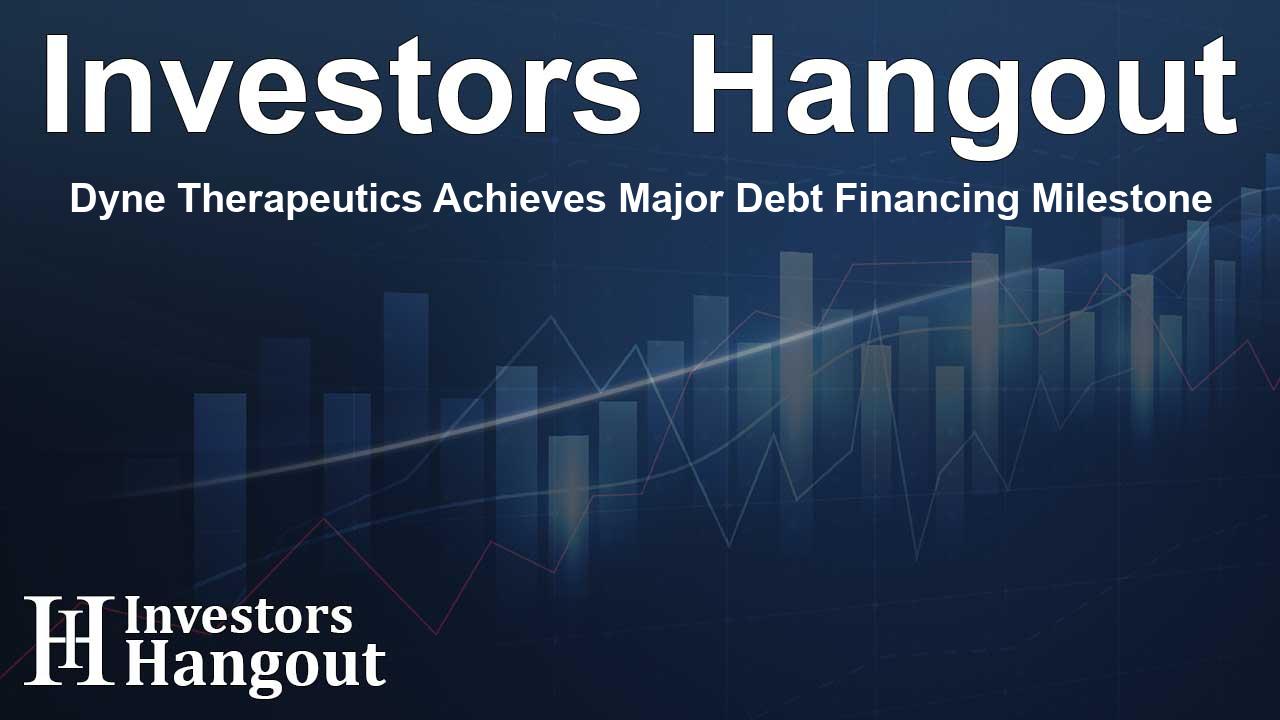Dyne Therapeutics Achieves Major Debt Financing Milestone

Dyne Therapeutics Achieves Major Debt Financing Milestone
The dynamic landscape of biotech funding continues to evolve, and Dyne Therapeutics, a pioneering entity in the neuromuscular disease sector, has recently made headlines by securing up to $275 million in debt financing from Hercules Capital. This strategic financial maneuver comes as a significant boost to their ongoing clinical efforts targeted at improving the lives of individuals living with genetically driven neuromuscular disorders.
Details of the Financing Arrangement
In an announcement filled with optimism, Dyne Therapeutics revealed that the financing consists of a non-dilutive senior secured term loan facility. An upfront funding amount of $100 million has been provided, with the potential for an additional $175 million available contingent on the achievement of specific clinical and regulatory milestones. This approach addresses both immediate funding needs and the diverse financial pathways required to navigate through critical points in development.
Strategic Goals and Applications
John Cox, the President and CEO of Dyne Therapeutics, expressed enthusiasm about this financial support, emphasizing how it positions the company to move forward with their clinical programs for myotonic dystrophy type 1 (DM1) and Duchenne muscular dystrophy (DMD). The promising potential for U.S. Accelerated Approval submissions for these therapies is currently targeted for 2026. Such advancements could play a pivotal role in broadening treatment options for patients suffering from these debilitating conditions.
The Role of Hercules Capital
Hercules Capital, recognized for its expertise in providing financial solutions for emerging companies in life sciences and technology, is collaborating closely with Dyne for this venture. R. Bryan Jadot, a senior figure at Hercules, highlighted their confidence in Dyne's leadership and pipeline, noting the critical need for innovative therapeutics in the neuromuscular disease sector.
Understanding Dyne Therapeutics' Mission
At the core of Dyne Therapeutics’ operations is the ambition to deliver meaningful improvements for individuals and families affected by neuromuscular diseases. Their innovative therapeutic portfolio not only addresses muscular health but also targets the central nervous system (CNS), aiming for a comprehensive approach to treatment.
The company is actively advancing programs that focus on conditions such as DM1 and DMD, while also exploring preclinical avenues for diseases like facioscapulohumeral muscular dystrophy and Pompe disease. Each of these areas presents unique challenges and opportunities, and Dyne is poised to tackle them head-on, driven by their mission to enhance the quality of life for affected individuals.
Future Outlook and Milestones
As Dyne looks ahead, the structured loan facility with Hercules Capital serves as a crucial lifeline, allowing the company to maintain momentum and focus on their strategic goals. The financing arrangement is divided into multiple tranches, providing access to capital as needed, contingent upon the successful navigation of clinical and regulatory achievements.
This model not only alleviates immediate financial pressures but also positions Dyne to capitalize on upcoming launches, particularly with plans to introduce DMD treatments in the U.S. market potentially by 2027. Such launches could dramatically shift the treatment landscape for patients and families affected by these profound conditions.
Key Takeaways
Dyne Therapeutics' successful acquisition of funding underscores a larger trend in the biotechnology industry—the transition towards non-dilutive financing options as companies seek to maintain operational agility while pursuing groundbreaking therapies. The collaboration with Hercules Capital exemplifies how strategic financial partnerships can drive innovation and support critical therapeutic developments.
Frequently Asked Questions
What is the significance of the $275 million funding for Dyne Therapeutics?
The funding is crucial for advancing Dyne’s clinical programs for neuromuscular diseases, specifically DM1 and DMD, providing both immediate capital and future funding tied to milestones.
Who is Hercules Capital and what role do they play?
Hercules Capital is a leading specialty finance company that provides debt financing to growth-stage firms, supporting Dyne in its mission to develop innovative therapies.
What are Dyne Therapeutics' main areas of focus?
Dyne focuses on developing therapeutics for DM1 and DMD while also researching other conditions such as facioscapulohumeral muscular dystrophy and Pompe disease.
When are the potential U.S. launches for the therapies?
The first potential U.S. market launch for DMD therapies is scheduled for 2027, highlighting the urgency and importance of Dyne’s clinical programs.
How does this financing impact Dyne’s financial strategy?
The financing enhances Dyne's strategic flexibility and reduces dilution for shareholders, allowing the company to maneuver more effectively through clinical development phases.
About The Author
Contact Thomas Cooper privately here. Or send an email with ATTN: Thomas Cooper as the subject to contact@investorshangout.com.
About Investors Hangout
Investors Hangout is a leading online stock forum for financial discussion and learning, offering a wide range of free tools and resources. It draws in traders of all levels, who exchange market knowledge, investigate trading tactics, and keep an eye on industry developments in real time. Featuring financial articles, stock message boards, quotes, charts, company profiles, and live news updates. Through cooperative learning and a wealth of informational resources, it helps users from novices creating their first portfolios to experts honing their techniques. Join Investors Hangout today: https://investorshangout.com/
The content of this article is based on factual, publicly available information and does not represent legal, financial, or investment advice. Investors Hangout does not offer financial advice, and the author is not a licensed financial advisor. Consult a qualified advisor before making any financial or investment decisions based on this article. This article should not be considered advice to purchase, sell, or hold any securities or other investments. If any of the material provided here is inaccurate, please contact us for corrections.
